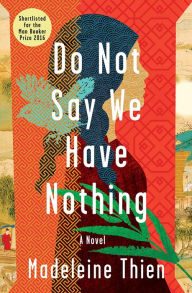
This novel took far longer to read than I expected for several reasons (not all of them bad). First, I got a bit distracted watching a few series on Netflix and HBO–yay summer! Second, I’ve been stealing some reading time to work on something else–also good news. Third, I kept stopping reading to listen to the classical music referred to in the novel. And fourth, the novel is challenging and I found I couldn’t read it in long, sustained sessions. I had to break it up more than for many novels.
Do Not Say We Have Nothing, a line from the Internationale, one of the people’s patriotic songs from Mao’s Cultural Revolution, is about a wide range of subjects: family, the individual vs. the state, classical music, Chinese history from the Cultural Revolution through the Tiananmen Square demonstrations in 1989, and the nature of many kinds of love. To say it’s a big and important novel is to state the obvious.
The central narrator, Marie, is explaining and trying to understand the lives of two families (and all their friends and colleagues) throughout this transformational time in China. Her father Jiang Kai was a brilliant classical pianist before the Revolution. His closest friend, and the person he loved the most in the world, was one of China’s most promising composers, Sparrow.
The book opens in Canada, when Sparrow’s daughter Ai-ming, shows up unexpectedly after fleeing China in the wake of the Tiananmen disaster, and she and Marie become inseparable. The rest of the novel explores all of the threads that exist between these two families over three generations.
For a Western reader who has a little understanding of China’s history, the book is readable but nevertheless challenging. Thien does assume the reader understands some of that history already, however. The novel’s also dense, with lots of characters and many story lines, so it requires a lot of concentration or the threads unravel quickly. Overall, though, it’s a fiercely powerful exploration of a great range of ideas, but what they all focus on is questions of personal identity: are we free to study what we want and to do the kind of work we want? Are we free to live where we want? Are we free to love whom we want? Are we free to be ourselves?
One note for the publisher: W.W. Norton, for shame. You have a lot of nerve charging $27 for a book with this many typos. This was clearly not proofread.
Do Not Say We Have Nothing, a line from the Internationale, one of the people’s patriotic songs from Mao’s Cultural Revolution, is about a wide range of subjects: family, the individual vs. the state, classical music, Chinese history from the Cultural Revolution through the Tiananmen Square demonstrations in 1989, and the nature of many kinds of love. To say it’s a big and important novel is to state the obvious.
The central narrator, Marie, is explaining and trying to understand the lives of two families (and all their friends and colleagues) throughout this transformational time in China. Her father Jiang Kai was a brilliant classical pianist before the Revolution. His closest friend, and the person he loved the most in the world, was one of China’s most promising composers, Sparrow.
The book opens in Canada, when Sparrow’s daughter Ai-ming, shows up unexpectedly after fleeing China in the wake of the Tiananmen disaster, and she and Marie become inseparable. The rest of the novel explores all of the threads that exist between these two families over three generations.
For a Western reader who has a little understanding of China’s history, the book is readable but nevertheless challenging. Thien does assume the reader understands some of that history already, however. The novel’s also dense, with lots of characters and many story lines, so it requires a lot of concentration or the threads unravel quickly. Overall, though, it’s a fiercely powerful exploration of a great range of ideas, but what they all focus on is questions of personal identity: are we free to study what we want and to do the kind of work we want? Are we free to live where we want? Are we free to love whom we want? Are we free to be ourselves?
One note for the publisher: W.W. Norton, for shame. You have a lot of nerve charging $27 for a book with this many typos. This was clearly not proofread.
 RSS Feed
RSS Feed
